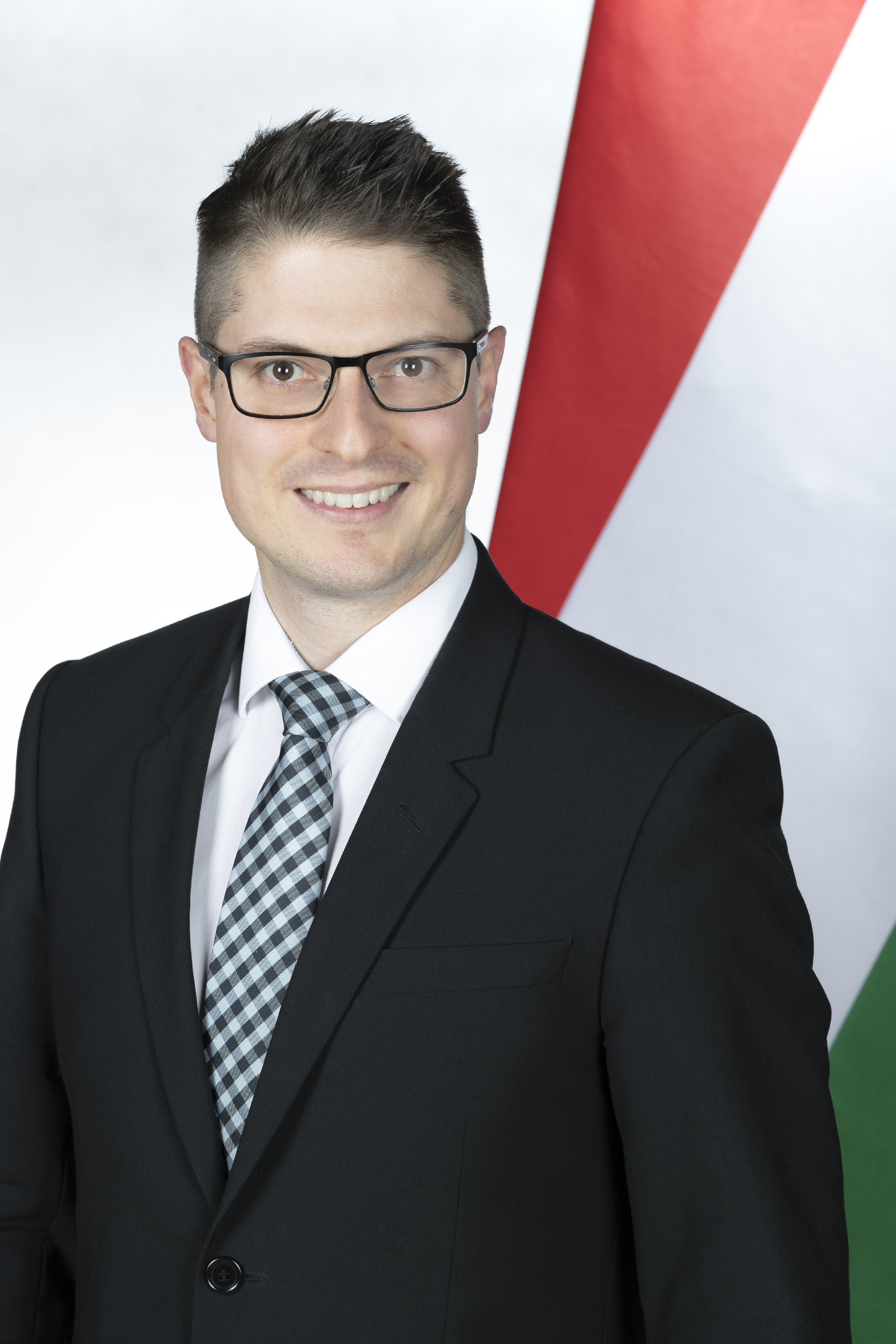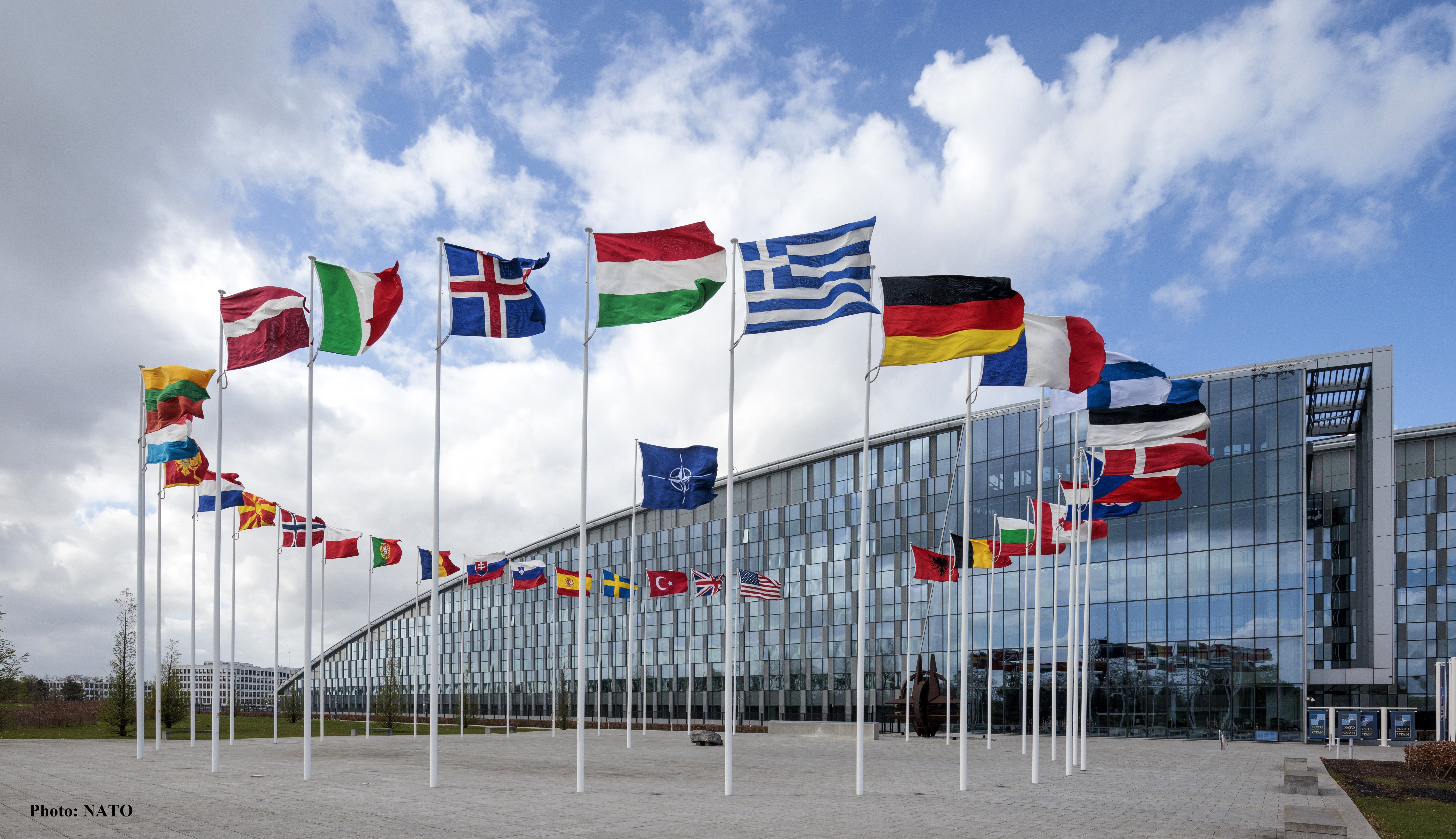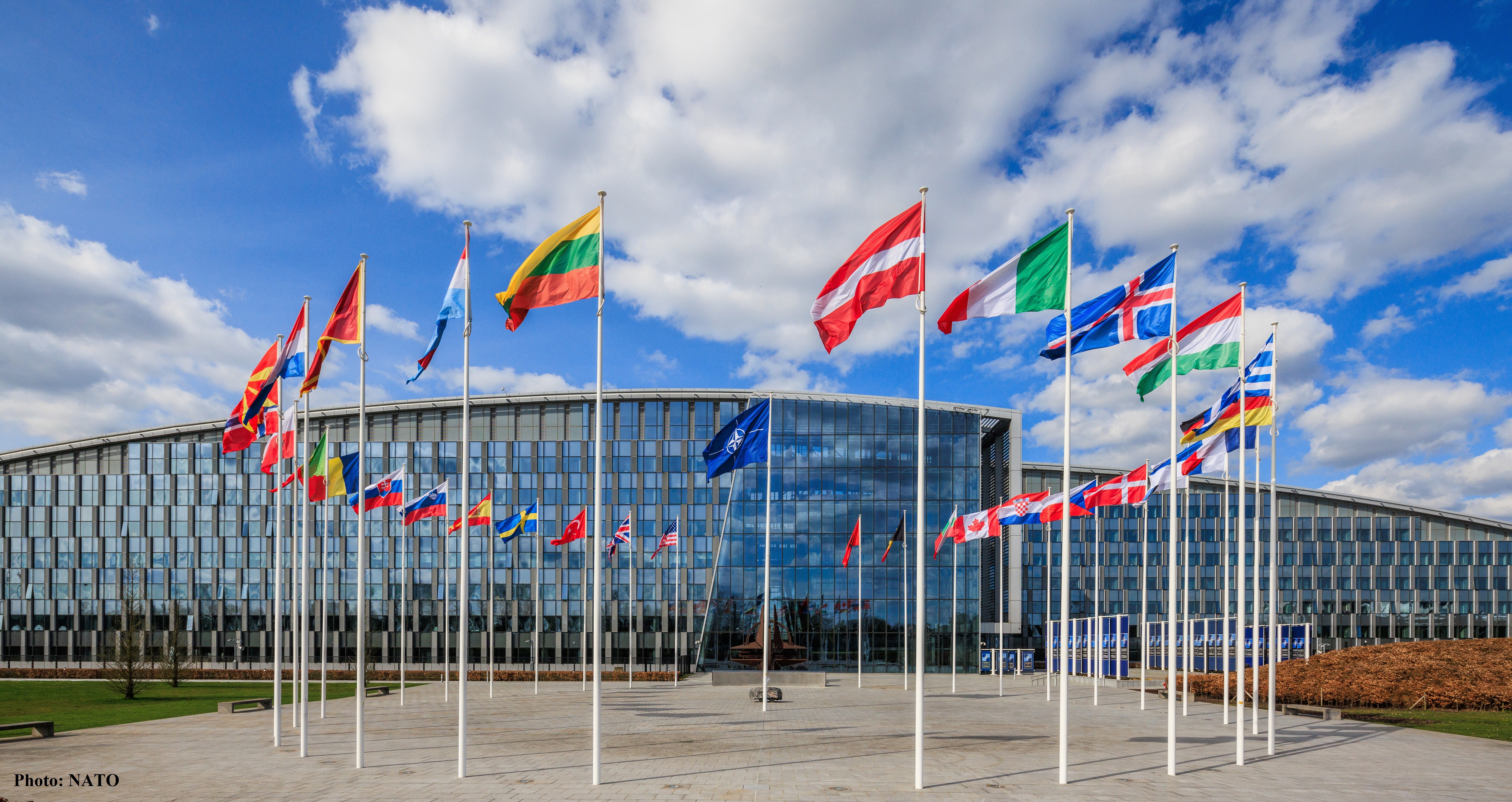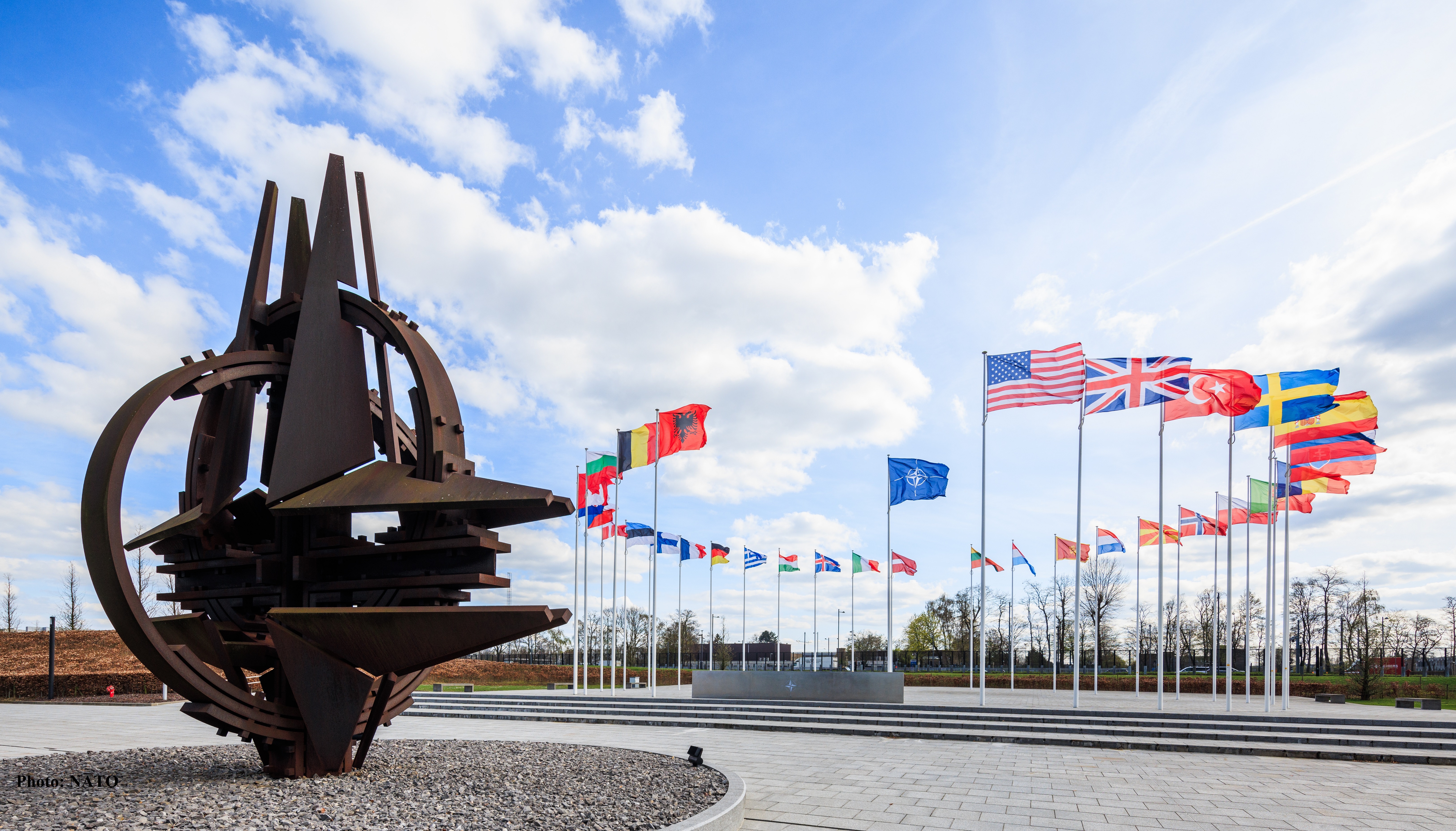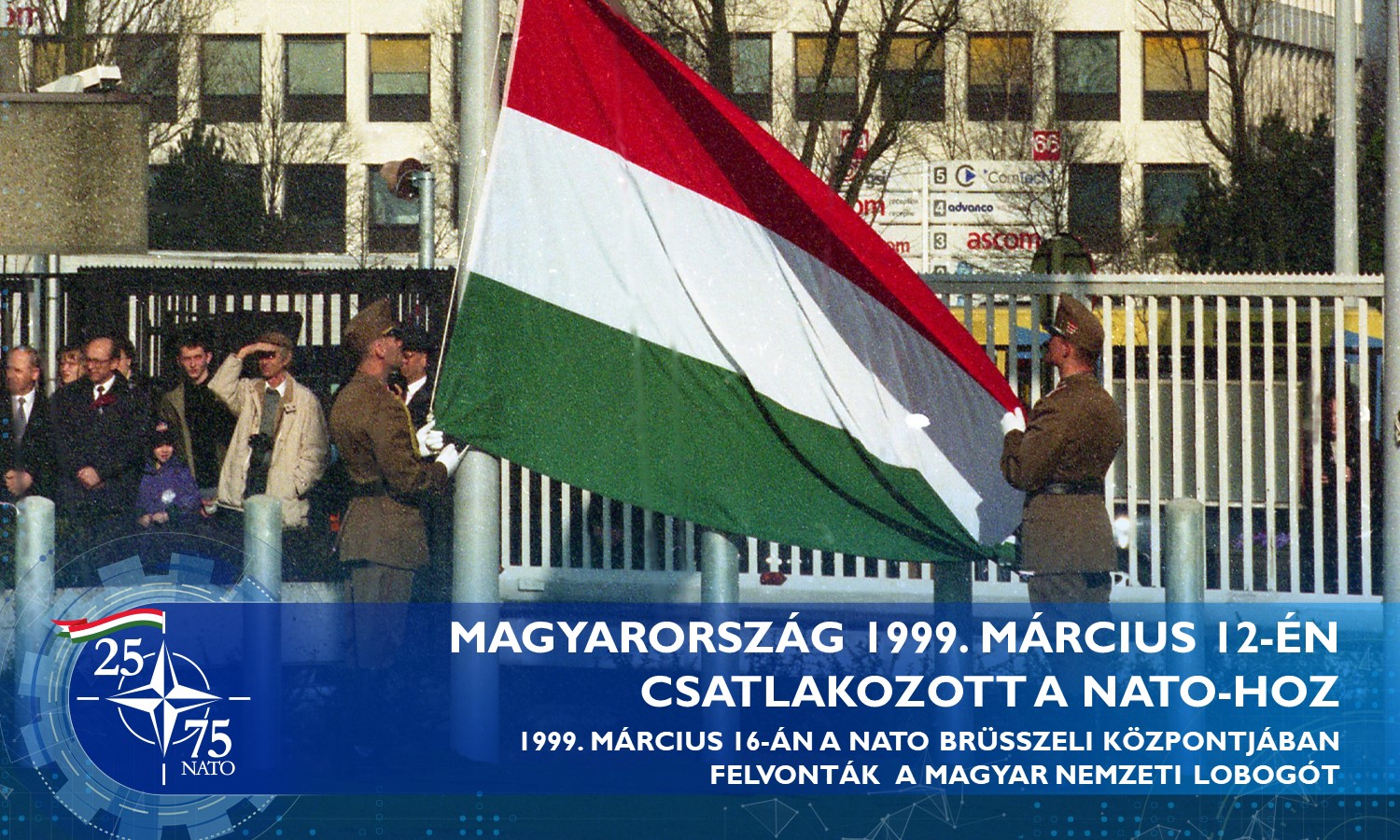Amíg nemzeti kormány van Magyarországon, addig nem fogják a magyarok pénzét Ukrajnába küldeni, hazánk így a fegyverszállításokat koordináló NATO-mechanizmusban sem fog részt venni - közölte Szijjártó Péter külgazdasági és külügyminiszter szerdán Brüsszelben.
TovábbNagyköveti köszöntő
Kedves Látogató!
Tisztelettel köszöntöm Magyarország Állandó NATO Képviseletének honlapján.
A brüsszeli NATO-székházban működő képviseletünk feladata a magyar nemzeti érdekek képviselete az Észak-atlanti Szerződés Szervezetében. Ugyanilyen fontos feladat a szövetségesi szolidaritás megerősítéséhez való hozzájárulás a NATO-val kapcsolatos valamennyi kérdésben. A Külgazdasági és Külügyminisztérium, a Honvédelmi Minisztérium, a Magyar Honvédség és a Belügyminisztérium Országos Katasztrófavédelmi Főigazgatóságának állományából delegált csapatunk minden egyes nap keményen dolgozik e célok elérése érdekében.
Az 1949. április 4-én, Washingtonban aláírt Észak-atlanti Szerződésben (közismertebb nevén: washingtoni szerződés) foglaltak alapján a Szövetség tagjai felelősséget vállalnak egymás biztonságáért, garantálva a szövetségesek kollektív védelmét. Magyarország maga is aktívan hozzájárul ehhez a kollektív védelemhez a vonatkozó nemzeti feladatok ellátásával, a Szövetség katonai műveleteiben és a fokozott éberségi tevékenységekben történő részvételével, saját védelmi képességeinek fejlesztésével, valamint a védelmi kiadások fokozatos növelésével.
A NATO történetének 75 éve alatt jelentős átalakuláson ment keresztül. Jóllehet a Szövetség alapvető funkciója és szerepe – mindenekelőtt a kollektív védelem – változatlan, a NATO a globális biztonságpolitikai rendszerben betöltött szerepe és nem utolsósorban tagsági köre jelentősen kibővült. Magyarország – Csehországgal és Lengyelországgal együtt – 1999. március 12-én vált a Szövetség tagjává, amely egész térségünk számára történelmi jelentőségű fejlemény volt. A NATO azóta több körben bővült, alátámasztva a NATO versenyképességét és a „nyitott ajtók politikájának” hitelességét.
Az ukrajnai háború alapvetően megváltoztatta Európa és a Szövetség biztonságpolitikai környezetét. A NATO és a szövetségesek kiállnak Ukrajna szuverenitása és területi integritása mellett. Magyarország az elmúlt években számos területen segítette a szomszédos Ukrajnát. Naponta fogad menekülteket, részt vesz Ukrajna újjáépítésében többek között oktatási és egészségügyi intézmények felújításával, továbbá segélyt biztosít számos területen (egészségügyi eszközök és felszerelések, élelmiszerek, higiéniai és gyermekgondozási cikkek). A humanitárius segítségnyújtáson túl támogatjuk az ukrán energetikai szektort, és elősegítettük az ukrajnai gabona tranzitját.
A háború kitörésével a NATO kidolgozta saját megközelítését az ukrajnai háborúval kapcsolatban. A Szövetség azonban nem részese a konfliktusnak. Az elmúlt években Magyarország konzisztensen érvelt amellett, hogy ennek így is kell maradnia. Magyarország Kormánya következetesen kiáll amellett, hogy ezt az alapelvet minden körülmények között tiszteletben kell tartani.
A hiteles kollektív védelem és szövetségi szolidaritás hatékony katonai képességeket követel meg, ami a tagállamok védelmi befektetéseinek, költségvetésének növelése nélkül elképzelhetetlen. Magyarország vállalta, hogy 2016-tól fokozatosan növeli védelmi kiadásait, ezáltal megfelelő mozgásteret biztosítva a Magyar Honvédség fejlesztéséhez. A védelmi kiadásaink 2016 óta több mint kétszeresére emelkedtek, 2023-ban elérték a 2%-ot – ezzel teljesítve a szövetségesek 2014‑es walesi csúcstalálkozón tett vállalását. Magyarország elkötelezett amellett, hogy teljesítse a szövetségesek 2025-ös hágai NATO-csúcson hozott történelmi jelentőségű döntését, miszerint 2035-ig a GDP 5%-át az alapvető védelmi és védelmi célú kiadásokra kell fordítani.
Napjaink globális biztonságpolitikai kihívásainak kezelése egyre szorosabb nemzetközi együttműködést igényel. A terrorizmus, a tömeges, illegális migráció, a tömegpusztító fegyverek és hordozóeszközeik terjedése, a kibertámadások fokozódása és a gyenge vagy működésképtelen államok jelentette instabilitás alapvetően módosították a biztonságról és az országvédelemről alkotott elképzeléseinket, valamint a biztonság és a nemzetvédelem kereteinek meghatározását. A NATO folyamatosan keresi a megfelelő válaszokat és eszközöket e kihívások, kockázatok és veszélyek kezelésére, szoros együttműködésben a további érintett nemzetközi szereplőkkel. E válaszokat mindenekelőtt a NATO feladatait és rendeltetését lefektető alapdokumentum, a 2022‑es madridi csúcson elfogadott Stratégiai Koncepció foglalja magában.
Válságkezelési tevékenységének keretében a NATO hozzájárul a nemzetközi béke és biztonság fenntartásához. Magyarország következetesen hozzájárul a NATO e téren tett erőfeszítéseihez. Hazánk nemzeti érdeke és egyben szövetségesi kötelessége is, hogy számottevő erővel vegyen részt a NATO műveleteiben és misszióiban. Műveleti szerepvállalásunk egyrészt erősíti a Magyar Honvédség nemzetközi szerepét és elismertségét, másrészt pedig a külföldi missziós részvétellel megszerzett tapasztalatokon keresztül elősegíti haderőnk felkészültségének erősítését. Ennek megfelelően Magyarország kiveszi a részét a közös erőfeszítésekből, hozzájárulva a stabilitáshoz és biztonsághoz többek között a Nyugat-Balkánon, valamint a Közel-Keleten. Különösen fontos a NATO koszovói missziójában (KFOR) való jelenlétünk. A misszió parancsnoki feladatait 2021 októberétől 2022 októberéig magyar tábornok látta el, ami történelmi eredmény Magyarország és a Magyar Honvédség számára.
Hazánk aktívan járul hozzá a regionális biztonsághoz is. A megszerzett missziós műveleti tapasztalatra is építve született meg az a politikai döntés 2019-ben, hogy Magyarország Horvátországgal és Szlovákiával közösen Székesfehérváron létrehozza a Közép-európai Többnemzeti Hadosztály-parancsnokságot. Ez a régióban feladatot teljesítő NATO erők vezetését és irányítását ellátni hivatott katonai szervezet, amely 2022. május 3. óta a NATO haderőstruktúra része. Mindez tovább erősíti hazánk és így a NATO szerepét régiónk biztonságának szavatolásában. Az ukrajnai háború hatására kezdeményezett keleti megerősítő intézkedések keretében Magyarország elsőként állított fel új, magyar vezetésű többnemzeti zászlóalj-harccsoportot 2022-ben (NATO Kiemelt Éberségi Tevékenység Harccsoport, eVA, majd NATO Előretolt Szárazföldi Többnemzeti Harccsoport, FLF BG HUN). A szükséges képességek rendelkezésre állását célozzák a NATO által felkarolt többnemzeti kezdeményezések, amelyek az erőforrások megosztását és hatékonyabb felhasználását teszik lehetővé. Ennek egyik kiváló példája a stratégiai légi szállítási program, amelynek a pápai katonai repülőtér, mint a NATO C-17-es szállítógépek befogadó bázisa ad otthont. A program keretén belül jelenleg tizenkét ország biztosít a NATO számára is kiemelten fontos képességet. Emellett Magyarország rendszeresen részt vesz a NATO balti légtérrendészeti missziójában (BAP). A magyar légierő továbbá aktívan hozzájárul a Szlovénia, Szlovákia és Horvátország feletti légtér biztonságához.
A tömeges, ellenőrizetlen migráció jelentette kihívást a NATO sem hagyhatja figyelmen kívül, mivel az a Szövetség biztonságát is érinti. Magyarország a kezdetektől fogva támogatja és szorgalmazza a NATO szerepvállalását a migrációs válság jelentette biztonsági kihívás kezelésében, és felhívja a figyelmet a terrorizmus és a migráció közötti összefüggésekre. Magyarország szerint ezek ellen a kihívások ellen úgy lehet a legjobban védekezni, ha a felmerülő problémákat a gyökerüknél kezeljük. Éppen ezért a Hungary Helps Programon keresztül igyekszünk megóvni azokat a közösségeket, amelyeket vallási, vagy más üldöztetés, erőszak, katasztrófa, vagy a migrációval összefüggő egyéb kihívás fenyeget. A Programon keresztül nyújtott humanitárius támogatásainkkal eddig több mint félmillió ember szülőföldön való megmaradását, vagy otthonába való visszatérését tettük lehetővé.
A partnerségi kapcsolatrendszer révén a Szövetség napjainkban közel negyven országgal tart fenn intézményes, vagy informális párbeszédet a kölcsönösen előnyös gyakorlati együttműködés kialakítása érdekében. Különösen fontos, hogy a NATO a legfontosabb nemzetközi szervezetekkel (ENSZ, EU, EBESZ) is egyre szorosabb kapcsolatot ápoljon. Kiemelkedő jelentőségű az EU-val megvalósulóstratégiai együttműködés.
Ahogy azt műveleti szerepvállalásunk is tükrözi, Magyarország számára kulcsfontosságú a nyugat-balkáni térség stabilitása. A hiteles euro-atlanti integrációs perspektíva fenntartása jelentősen hozzájárul e cél eléréséhez, így Magyarország továbbra is támogatja ezt a célt.
Hazánk elkötelezett továbbá a Washingtoni Szerződés III. cikkéből eredő kötelezettségeink teljesítése, és így a Szövetség kollektív védelméhez való hozzájáruláshoz szükséges nemzeti kapacitásaink továbbfejlesztése mellett. Ezért 2016-ban elindítottuk a Magyar Honvédség elmúlt 35 évének legátfogóbb haderő-korszerűsítési programját. Ezekkel az erőfeszítésekkel összhangban Magyarország úgy döntött, hogy újjáéleszti védelmi iparát is. Úgy gondoljuk, hogy ez nemcsak ellenálló képességünket és nemzeti kapacitásainkat erősíti, hanem hozzájárul a Szövetség védelmi ipari bázisához is. Az új generációs haditechnikai eszközök beszerzése mellett aktívan részt kívánunk venni és befektetni a képességfejlesztésbe, a védelmi innovációba, a digitalizációba és az űrkutatásba. Következésképpen, miközben a jelen igényeire összpontosítunk, olyan képességekre törekszünk, amelyek a jövőben is garantálják a biztonságot.
A fentiek érdekében és egy erős védelmi ipar részeként már megkezdődött a gyalogsági harcjárművek, a lőszertípusok széles skálájának hazai előállítása, valamint a precíziós helikopterek alkatrészeinek teljes körű gyártása. A gyártási infrastruktúra bővítésével párhuzamosan prioritás a magánszektorban érdekelt felekkel való kapcsolatok erősítése, különösen az IT-biztonság, a digitalizáció és az innováció területén. Magyarország arra törekszik, hogy vállalatai képesek legyenek összekapcsolódni, együttműködni, és ezáltal a NATO technológiai és ipari ökoszisztémájának értékes részeivé váljanak. Törekvéseink támogatása érdekében létrehoztuk a Védelmi Innovációs Kutatóintézetet is.
Az Állandó NATO Képviseleten dolgozó munkatársaimmal együtt fáradhatatlanul dolgozom azon, hogy nemzeti érdekeinket és értékeinket a lehető legkövetkezetesebb módon képviseljük a Szövetségben. Ebben a törekvésünkben a „békéhez erő kell” alapelv vezérel bennünket. A békét csakis erővel és ellenállóképes védelemmel lehet megvédeni. Egy erős Magyarország hozzájárul a NATO további sikeréhez, egy erős NATO pedig megerősíti Magyarország biztonságát. Így Magyarország a szövetségesi egység és szolidaritás jegyében kihasználhatja a NATO-tagság előnyeit és lehetőségeit. Ennek megfelelően a mottónk a következő: „Erős Magyarország! Erős NATO!”
Balogh István
nagykövet, állandó képviselő
